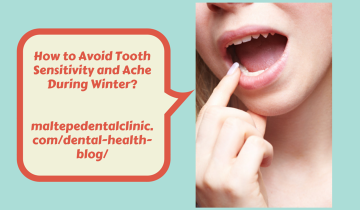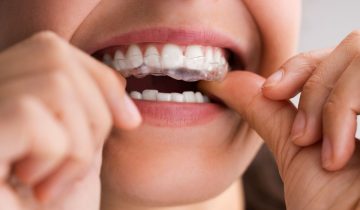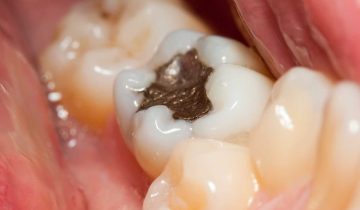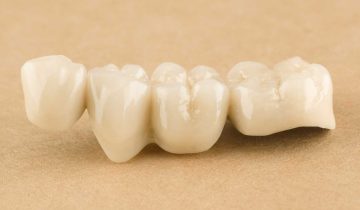Last updated on August 16th, 2023
Sensitive teeth, also known as dentin hypersensitivity, are a common dental condition characterized by discomfort or sharp, sudden pain in your teeth when they encounter certain substances and temperatures.
It can be a chronic or temporary problem caused by worn tooth enamel or receding gums, and it can affect one tooth or several teeth. Since there are several considerations around the issue, patients might have a hard time figuring out the causes or potential treatments for sensitive teeth.
Teeth sensitivity typically arises when the tooth’s enamel (the outer protective layer of the tooth) is worn down or when the gum line has receded, exposing the underlying layer of the tooth called the dentin. The dentin contains tiny tubules that lead to the tooth’s nerve center (the pulp). When these tubules are exposed, they allow heat, cold, or acidic substances to reach the nerves and cells inside the tooth, leading to sensitivity.

In this post, we are going to shed light on the causes and treatments available for sensitive teeth. However, we can only provide you with the best of our knowledge and experience, but it should be your dentist who will make the final decision in your case.
What Causes Sensitive Teeth?
Causes of sensitive teeth can include:
- Tooth decay (cavities)
- Fractured teeth
- Worn Fillings
- Gum disease
- Worn Tooth Enamel
- Exposed tooth root due to receding gums
Tooth Decay (Cavities):
One of the most common causes of sensitive teeth is tooth decay. It is a serious problem, but fortunately, it is easy to detect.
Fractured Teeth:
Another easy-to-observe problem is fractures in a tooth. Even a very little fracture can lead to sensitivity and a great amount of pain.
Worn Fillings:
Worn fillings mean that your fillings cannot serve to protect your teeth against extrinsic factors anymore, which triggers teeth sensitivity to cold or hot drinks.
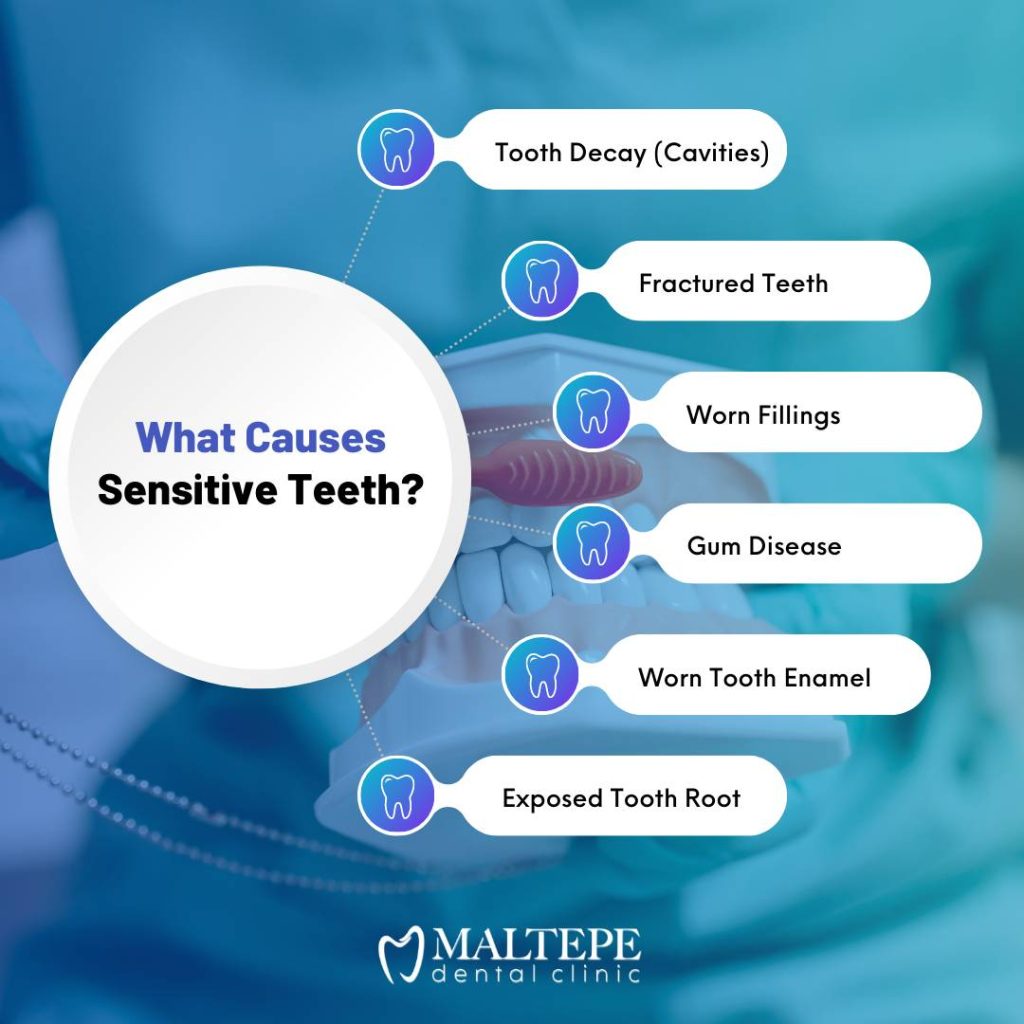
Gum Disease:
Sensitivity can be triggered by inflamed or sore gums, too. When there is gum disease, the surface of a tooth’s root becomes vulnerable to damage and in most cases, you will feel sensitivity.
Worn Tooth Enamel:
When you feel discomfort while eating cold, hot, or sweet foods it can be due to your eroding enamel. The pain gets worse as you lose more of the enamel layer.
Exposed tooth root due to receding gums:
While some incidences of exposed roots of teeth are the result of gum disease, you can still experience receding gums due to other factors such as the natural aging process or a genetic predisposition. Depending on the number and portion of exposed teeth will determine the intensity of the sensitivity.
Speaking of the source of sensitive teeth, it should be noted that there are some habits that might cause sensitivity such as:
- teeth grinding,
- using a hard toothbrush,
- brushing your teeth too hard,
- eating or drinking acidic food or drinks.
They can either start or aggravate the problem of teeth sensitivity.
When Do You Normally Have Teeth Sensitivity?
Here are some of the most common activities that end up leading to teeth sensitivity. Though they may not necessarily be teeth sensitivity reasons, you can still feel uncomfortable doing one of the things in the list below. However, there’s no need to worry about this type of sensitivity as they are anticipated and temporary in most cases.
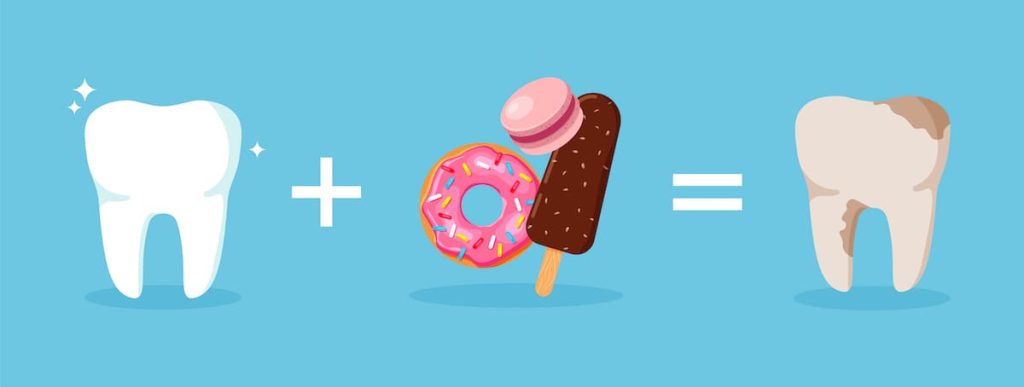
Teeth Sensitivity After Cleaning
Some patients that are having a deep dental cleaning may experience sensitivity afterward. Since the tartar buildup, dental plaque, and toothpaste deposited in the dentin tubules over the years are removed from the teeth, the nerve of the tooth suddenly starts to receive the signals. This sudden influx of signals causes temporary sensitivity.
Teeth Sensitivity After A Crown
A dental crown is a “cap” that is placed over a tooth to restore its shape, size, and strength, and to improve its appearance. It’s a common dental procedure, but it can sometimes result in temporary tooth sensitivity. This can occur for a few reasons:
- The Procedure Itself: The process of preparing your tooth for a crown can irritate the nerve in the center of the tooth, leading to sensitivity. This is usually temporary and should subside within a few days to a couple of weeks as your mouth heals.
- Close Proximity to the Nerve: If the crown is near the nerve of the tooth, you may experience sensitivity, particularly to hot or cold foods and drinks. This can take a few weeks to months to fully resolve as the tooth and nerve adapt to the new crown.
- Improper Fit or Alignment: If the crown doesn’t fit correctly, or if it has altered your bite (the way your teeth align when you close your mouth or chew), it could result in sensitivity or discomfort. If you notice this, you should reach out to your dentist. They may need to adjust the crown.
- Post-Procedure Inflammation: After a crown placement, the surrounding gum tissue may be inflamed, which could also cause sensitivity.
If sensitivity after a dental crown placement persists for more than a few weeks, or if it becomes severe, it’s important to contact your dentist. Persistent sensitivity could be a sign of an underlying problem, such as nerve damage or an infection, which may need further treatment.
Teeth Sensitivity After Filling
After you have a dental filling, it’s not unusual to experience some sensitivity in the treated tooth. This can happen for several reasons.
Firstly, the process of preparing and cleaning the tooth for the filling can irritate the nerve inside the tooth, resulting in temporary sensitivity. This sensitivity typically subsides within a few days to a week as the tooth heals and the nerve calms down.
Secondly, if the filling is very deep and close to the dental nerve, the tooth can become more sensitive, especially to temperature changes. This is because the filling material doesn’t insulate against temperature as well as natural tooth structure. This type of sensitivity can take a little longer to settle down, possibly a few weeks or even months.
Lastly, the filling material itself can also cause sensitivity. Some people might have a reaction to certain materials used for fillings, such as metal amalgam or certain types of resin.
In most cases, sensitivity after a dental filling should gradually decrease on its own. However, if the sensitivity persists or gets worse, it’s important to contact your dentist. It could be a sign that the filling is not fitting properly, that there’s a problem with the nerve in the tooth, or even that the tooth has a crack.
In the meantime, you can manage the sensitivity by avoiding hot or cold foods and drinks, using toothpaste designed for sensitive teeth, and brushing and flossing gently around the affected area. Pain relievers may also help manage the discomfort, but always consult with your dentist or a healthcare professional before starting any new medication regime.
Teeth Sensitivity After Permanent Retainer Removed
Permanent retainers are used to keep teeth in the desired position to ensure they don’t go back to the initial position. Due to the wearing down of the permanent retainers you might need to get them removed and new ones put in. Since there is a sudden change in pressure, you might have sensitivity or discomfort at first, and this is normal. However, this issue should go away when you get your new retainers. If you still feel discomfort even after the placement of the retainers, you should see your dentist.
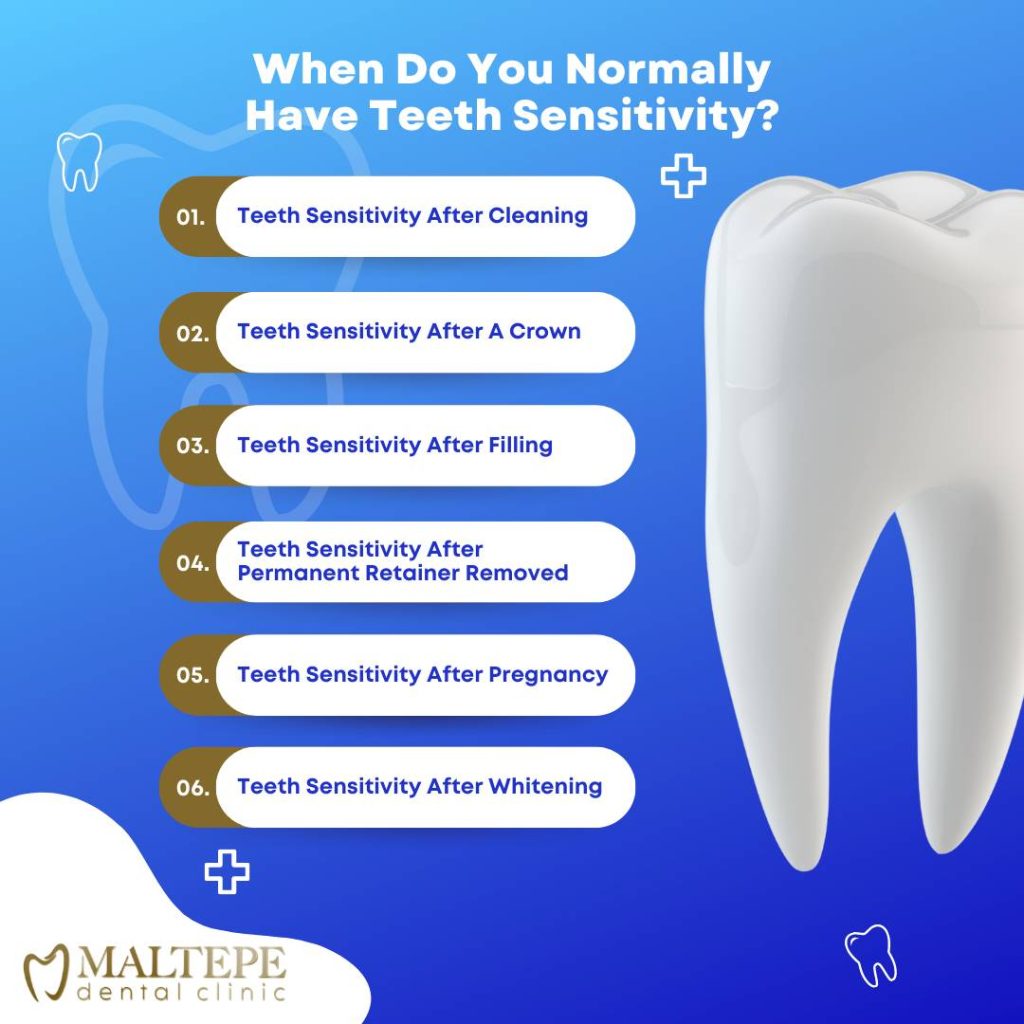
Teeth Sensitivity After Pregnancy
Pregnancy involves many hormonal changes that can impact various aspects of your body, including your oral health. Some women may notice increased sensitivity in their teeth during or after pregnancy due to the following reasons:
- Gingivitis: Pregnancy hormones can make your gums more susceptible to plaque, leading to inflammation and gingivitis, a mild form of gum disease. Gingivitis can cause your gums to recede, exposing more of your tooth and root surfaces and potentially leading to sensitivity.
- Increased Blood Flow: Pregnancy increases blood flow to all your body’s tissues, including your gums. This can cause your gums to swell and become more sensitive, which might make your teeth feel more sensitive as well.
- Acid Erosion: If you’ve experienced morning sickness with a lot of vomiting, the acid from your stomach can erode your tooth enamel over time, which can lead to sensitivity.
- Changes in Diet: Pregnant women sometimes experience cravings for specific foods. If these foods are acidic or sugary, they can contribute to tooth decay and increased sensitivity.
If you experience tooth sensitivity during or after pregnancy, there are a few steps you can take. Using toothpaste designed for sensitive teeth may help, as can avoiding extremely hot or cold foods and beverages that trigger the sensitivity. Good oral hygiene habits, including brushing twice a day and flossing daily, are also important. Using baking soda or applying natural oils like coconut, or peppermint might help mothers ease the discomfort while brushing their teeth.
For more information, you can read the periodontal disease during pregnancy blog post.
Teeth Sensitivity After Whitening
Teeth whitening is an effective and affordable way to get rid of stains to achieve a better smile. Unfortunately, teeth sensitivity after whitening is a common problem. Although the pain is only temporary, you can minimize the discomfort by using special kinds of toothpaste that can block pain signals before it reaches your teeth’s nerves.
As you can see, the sensitivity issues mentioned here are mostly temporary or easy to deal with. However, if you have prolonged discomfort or severe pain due to sensitivity, you are strongly advised to see your dentist.
What To Do For The Treatment Of Sensitive Teeth?
You should take care of persistent and severe sensitivity because it could be serious. By simply visiting your dentist and discussing the issues you can, in many cases, rid yourself of these problems as they offer effective and concise treatments. Here are some professional treatments you can get from a dentist or a clinic.

Fluoride
Dentists can protect your sensitive teeth with fluoride. Fluoride reduces the pain by strengthening the tooth enamel. If a further application of fluoride is needed, your dentist can prescribe it so that you can apply it at home yourself.
Bonding
If the cause of the problem is exposed roots, bonding can be applied to the area to relieve the pain. Bonding resin is an effective way to protect the sensitive exposed roots of your teeth. Your dentist can decide whether you need this treatment depending on the severity and type of sensitivity.
Surgical Gum Graft
Gum grafting is a relatively advanced treatment. If you have lost a significant amount of gum tissue it could lead to further problems including teeth sensitivity. Therefore, you may need to get gum grafting surgery. In this treatment, your missing gum is filled in using gum tissue from elsewhere. Since your teeth roots are better protected you have less or no sensitivity.
Root Canal
The root canal is a drastic solution for a teeth sensitivity treatment. If you are suffering from persistent teeth sensitivity, and other simpler treatments don’t work for you then your dentist might consider this treatment. The soft core of the tooth is removed in this procedure, and the sensitivity is eliminated.
What Are Some Teeth Sensitivity Home Remedies?
Regular appointments with a dentist and getting professional treatment is always of great importance. Even so, you can still relieve the pain caused by tooth sensitivity through these home remedies:
- Capsaicin
- Desensitizing toothpaste
- Saltwater rinse
- Hydrogen peroxide
- Honey and warm water
- Vanilla extract
- Turmeric
- Green Tea
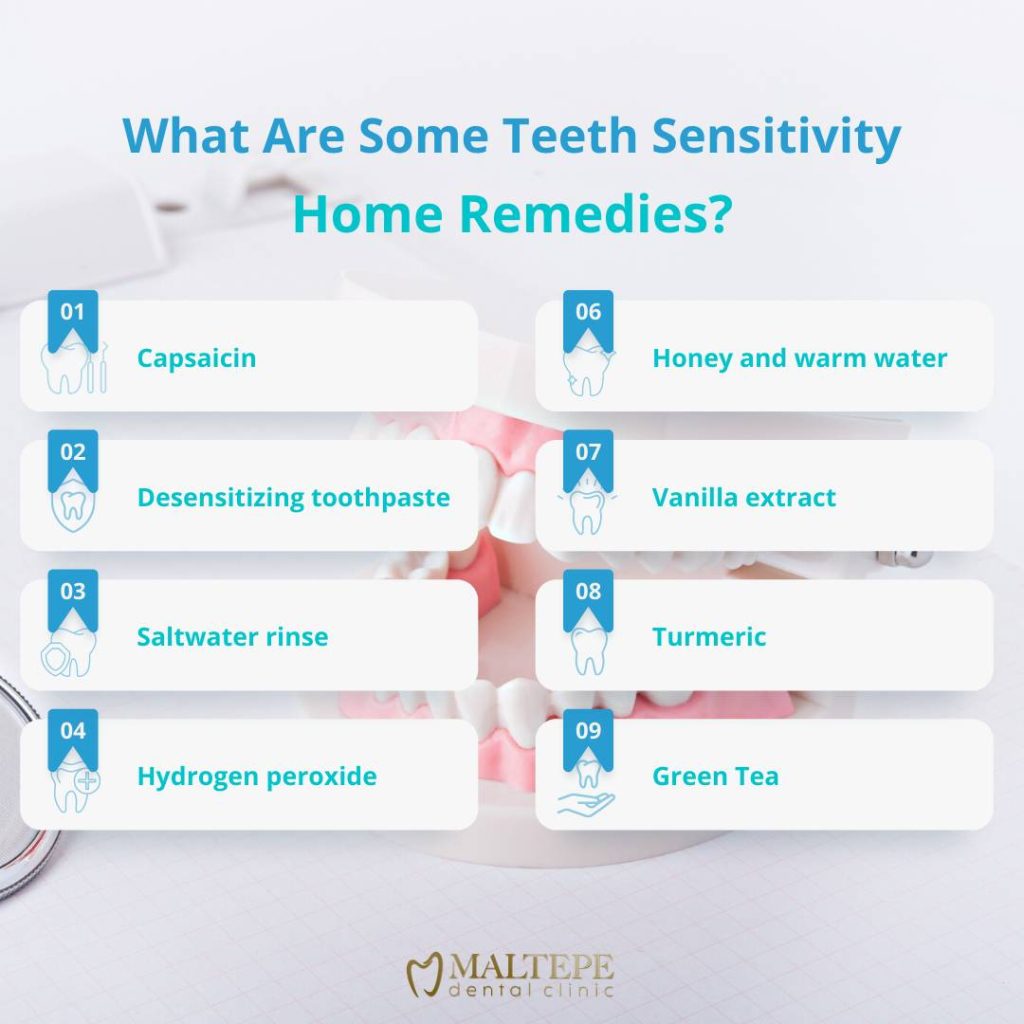
FAQs About Sensitive Tooth Sensitivity
Here are some of the most sought-after questions and answers about teeth sensitivity compiled for you.
Are Sensitive Teeth A Pregnancy Symptom?
Teeth sensitivity in pregnancy is a common issue. Moreover, along with some other changes, sensitive teeth are one of the subtle signs observed in early pregnancy, which might tell you a baby is on board. Whether you will still have sensitive teeth at the end of pregnancy depends on breastfeeding. As stated above, breastfeeding can be a factor in sensitive teeth.
How To Treat Cold Sensitive Teeth?
Nerve fibers in the tooth structure are sensitive to cold, and thus it is more likely to have a tooth sensitive to cold. Also, the cold air outside and hot drinks inside the mouth trigger sudden expansion and contraction of the front teeth. The adjustment gets harder as the range of temperatures increases, and it ends up with pain and discomfort.
The treatment of tooth sensitivity in winter is not much different than general sensitivity. But additionally, you can try breathing through the nose rather than your mouth in order not to make sudden changes in the temperature in your mouth.
How To Whiten Sensitive Teeth?
To whiten sensitive teeth, use toothpaste designed for sensitivity, consider gentle over-the-counter whitening products, or opt for professional whitening by a dentist. Avoid stain-causing foods and maintain good oral hygiene. Always consult a dentist before starting whitening treatments.
Are Sensitive Teeth Genetic?
Yes, genetics is a factor in sensitive teeth. Cases like dentinogenesis imperfections or enamel hypoplasia make your teeth more prone to sensitivity.
I Have Pain Only When I’m Biting Down. Does It Mean Sensitivity?
Not necessarily. In fact, the possibility that you have a sinus infection is higher.
Can Diet Cause Sensitive Teeth?
It depends on the diet you are having. For example, there can be an increase in the cases of sensitive teeth on the keto diet. The Keto diet is also responsible for bad breath due to the activation of fatty acids in the body.


